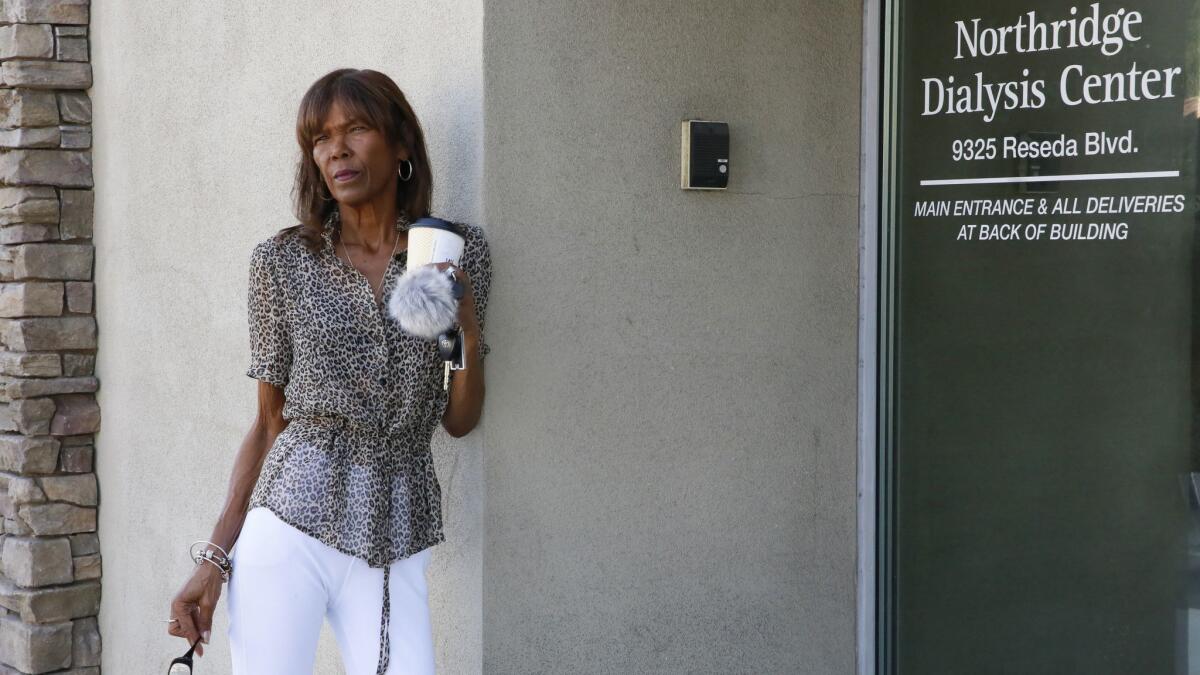Column: How profiteering by the same dialysis firms trying to kill Proposition 8 almost destroyed Obamacare

Things were looking bad for the Affordable Care Act in 2016 and 2017.
Major insurance companies were bailing out of the ACA’s insurance exchange market, complaining that the costs of covering new patients were coming in way higher than expectations.
UnitedHealth, the nation’s biggest insurance carrier, dipped its toes into the Obamacare market and couldn’t wait to bail out. Aetna said early in 2016 that it considered the exchange market to be a good investment in future growth, then weeks later reversed course and said it would sharply pare down its participation. Anthem complained endlessly about unexpected costs.
We’ve had what we think is a material uptick in dialysis cost.
— Joe Swedish, then-CEO of Anthem, in 2016
These complaints were pitilessly exploited by President Trump, House Speaker Paul Ryan (R-Wis.) and other Republicans, who argued that they proved that Obamacare was hopelessly dysfunctional.
Since then, however, a more interesting story has emerged. Underlying much of the unexpected cost of covering patients in Obamacare was a single industry — private dialysis firms, which have been accused of gaming the system to fatten their own profits. They did so with an alleged scheme that came under attack by federal healthcare regulators under President Obama, but has been allowed to continue under Trump.
The two biggest firms in this business are Denver-based DaVita and German-owned Fresenius, which operate clinics where desperately ill patients go to have their blood artificially filtered because their kidneys no longer function adequately. The two firms’ 4,900 outpatient clinics account for roughly 70% of the market. They serve about 400,000 patients, who typically go several times a week.
You should get to know these names because they’re the targets of Proposition 8 on November’s California ballot. The measure would cap the firms’ profits and provide incentives for higher staff levels and pay at their hundreds of California clinics.
Unsurprisingly, they’re also the principal donors to the No on 8 campaign. With weeks to go until the election, the Proposition 8 battle is shaping up to be one of the most expensive initiative campaigns in U.S. history, challenging the $130 million spent on Proposition 61 in 2016. The pharmaceutical industry spent $119 million of that total in its successful effort to defeat Proposition 61, which would have capped some drug prices in California.
A similar effort is unfolding on Proposition 8. The dialysis industry has contributed more than $99 million to the No campaign, with DaVita putting up about $61.5 million, Fresenius about $27.7 million and smaller dialysis firms the rest, according to the latest filings with the California secretary of state. The measure’s sponsor, the Service Employees International Union (which is hoping to unionize dialysis workers) has spent about $20 million so far on the Yes on 8 campaign.
The fact that the dialysis companies consider campaign spending of this magnitude to be a bargain should give you a sense of the money at stake. Dialysis is fabulously profitable for the companies. DaVita earned pretax operating profit of about $1.8 billion on $10.1 billion in dialysis revenue last year. Fresenius reported pretax operating profit of $2.3 billion on dialysis revenue of $11.7 billion in North America.
The key to these lavish earnings is the companies’ ability to extract rich reimbursements from private insurance companies covering their patients. And that’s where the gaming of the Affordable Care Act comes in. Here’s how it worked.
Before the ACA, patients with end-stage renal disease — that is, those dependent on dialysis or needing a kidney transplant — were virtually uninsurable in the individual market because dialysis then cost as much as $90,000 a year per patient. As a result, Congress in 1973 allowed renal patients to enroll in Medicare at any age.
Medicare pays about $260 per dialysis treatment; at three treatments per week, that means a Medicare patient is worth only about $40,500 a year to the dialysis firms. Private insurers, which pay the firms on an out-of-network basis, reimburse $2,000 to $4,500 per session, or even more. So that same patient could be worth hundreds of thousands of dollars — if they had private insurance.
Thanks to the ACA and its ban on rejecting patients with preexisting medical conditions, starting in 2015 private insurers no longer could turn down dialysis patients for coverage. Insurers in the ACA exchanges soon found themselves inundated with kidney patients. “We’ve had what we think is a material uptick in dialysis cost,” Anthem’s then-chief executive, Joe Swedish, told Wall Street analysts in July 2016. Blue Shield of California told federal officials its dialysis claims had rocketed up from about $7.5 million in 2014 to nearly $30 million in 2016. The insurer says it expects to spend $34.6 million on dialysis this year.
Aetna, in announcing its withdrawal from many ACA exchanges in August 2016, stated only that “individuals in need of high-cost care represent an even larger share of our on-exchange population” than expected. But when Aetna sued DaVita in Pennsylvania state court a few months later to gain access to DaVita documents, it got specific: Many of those high-cost patients were on dialysis. (There’s also evidence that Aetna was following up on its threat to pull back from the ACA exchanges if the government blocked its merger with Humana, which happened.)
Aetna charged in its lawsuit that DaVita had been deliberately “steering” its patients away from Medicare and into commercial insurance, the goal being to line its pockets by capturing the higher private reimbursement rates. Its allegations resembled those in lawsuits and comments to regulators filed by other insurers and healthcare firms.
The key to steering, according to these allegations, is the American Kidney Fund, a charity that has obtained 78% of its revenue in recent years — a combined subsidy of more than $200 million a year — from DaVita and Fresenius, according to the fund’s annual report.
The American Kidney Fund pays eligible patients’ insurance premiums, whether for private insurance or Medicare, according to the Aetna lawsuit and a case filed by UnitedHealth against American Renal Associates, another dialysis firm. Since the fund’s grants end within a year after a patient receives a kidney transplant, plainly the dialysis companies are major beneficiaries of the grants they support through their own donations. (The fund told me its charitable grants are “agnostic to the type of insurance a patient has and which provider a patient chooses.”)
This funding, according to the allegations, allows the dialysis firms to encourage patients to switch to or keep private insurance, since the patients’ premiums will be paid by the charity. UnitedHealth alleged that American Renal Associates “systematically targeted” Medicaid- and Medicare-eligible patients to persuade them to drop or reject their government options and enroll in UnitedHealth’s plans, which paid reimbursements as much as 10 times higher. ARA settled with United in July for $32 million.
In 2016, Medicare officials started collecting information from insurers and others about the alleged steering. It said its concern was that the practice could “raise overall health system costs, … result in higher out-of-pocket costs for enrollees, and have a negative impact on the individual market single risk pool.”
Among the responses the agency received were accusations that the dialysis firms were targeting low-income patients with poor English skills and little understanding of the ramifications of switching their insurance from Medicare or Medicaid.
In December, Medicare officials issued a rule requiring that dialysis firms disclose to patients that they contributed to the charity paying their premiums and giving insurers the right to turn away patients receiving the charitable help. But the rule was blocked by a federal judge in Texas on a motion brought by DaVita, Fresenius and an advocacy group called Dialysis Patient Citizens, which was founded by DaVita. The rule-making has stagnated under Trump, whose secretary of Health and Human Services oversees Medicare. Since January 2017 there has been no action on the rule, and according to DaVita’s latest annual report none is expected for 2019.
DaVita told me by email that it doesn’t steer patients. “We dispute the allegation,” the company said. “For some patients Medicare is the best insurance, while for others commercial coverage is much better than Medicare.”
But it also has acknowledged the importance of the American Kidney Fund — and its commercially insured patients — to its bottom line. Last year the firm disclosed that the American Kidney Fund paid private group or individual insurance premiums for 5,800 of its 197,800 U.S. dialysis patients. The firm indicated that those patients — 2.9% of its case load — accounted for more than $540 million, or more than 30%, of its annual operating profit.
The California Legislature passed a bill this year that would have limited reimbursements to Medicare rates for dialysis patients who receive premiums via charity — a provision that could have cut DaVita’s profit by as much as $90 million. It was vetoed by Gov. Jerry Brown, who said that by allowing insurers to refuse to accept premium payments from charity the bill “goes too far.”
The development of dialysis into a profit center for commercial companies has pushed up costs for insurers — and therefore their customers — while undermining public healthcare programs. DaVita and Fresenius are the major donors to an organization whose grants in thousands of cases are beneficial to their own bottom lines, a circular process that helped drive major insurance companies out of the Affordable Care Act exchanges in many states, while handing a talking point to cynical politicians who had anything but the public interest at heart.
Now the same companies are spending gobs of cash to kill a ballot measure by claiming it’s bad for patients. One thing that’s obvious is that the defeat of Proposition 8 would make DaVita, Fresenius and other profit-making dialysis providers very happy, and keep them very rich. Otherwise, why would they be spending so much to kill it?
Keep up to date with Michael Hiltzik. Follow @hiltzikm on Twitter, see his Facebook page, or email michael.hiltzik@latimes.com.
Return to Michael Hiltzik’s blog.
More to Read
Inside the business of entertainment
The Wide Shot brings you news, analysis and insights on everything from streaming wars to production — and what it all means for the future.
You may occasionally receive promotional content from the Los Angeles Times.







